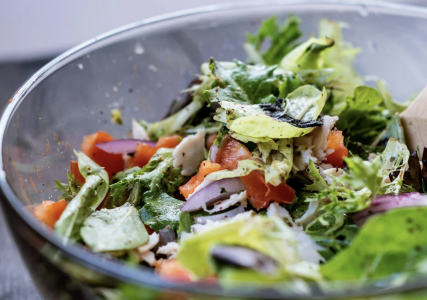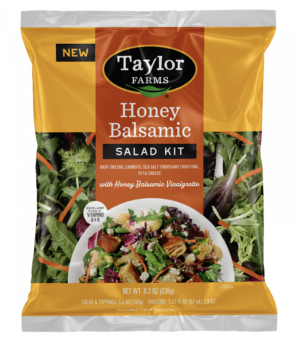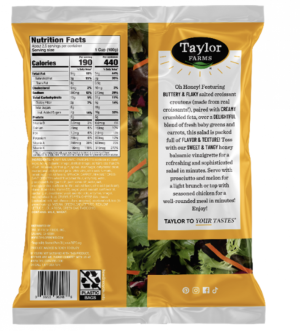Popular salad kit recalled at Walmart—check your fridge
By
Veronica E.
- Replies 0
If you’re someone who enjoys the ease of pre-packaged salad kits, it might be time to take a closer look at your fridge.
One popular item, sold in stores across the country, has recently come under scrutiny.
The issue may not be immediately obvious, but for certain households, it could present more than just a minor inconvenience.
With safety alerts making headlines and shoppers being urged to check their labels, many are wondering if their go-to grocery staple is affected.
Let’s take a closer look at what’s going on—and whether it could impact your next meal.

The mix-up: wrong dressing, wrong ingredients
The recall involves the Taylor Farms Honey Balsamic Salad Kit, an 8.3-ounce pre-packaged salad known for its sweet, tangy flavor.
However, some of these kits may actually contain an Asian sesame-ginger dressing—a completely different formula that includes sesame and soy, two top allergens in the US.
These ingredients are not listed on the label, making the product unsafe for people with allergies who may unknowingly consume it.
Also read: This canned beverage is under recall—here’s why
Where the recalled kits were sold
This isn’t limited to one store or region.
The recalled salad kits were distributed across 25 states, including:
If you shop at Walmart, Kroger, or similar retailers in any of these states, it’s worth checking your salad drawer.
Also read: Sweet treat recall issued across 20 states—check your pantry
What to look for on the package
Consumers should look for Taylor Farms Honey Balsamic Salad Kits in 8.3-ounce plastic packaging.
The impacted products include code dates starting with “TFRS” and best-by dates up to and including September 4, 2025.
If you spot one of these in your fridge, don’t eat it—especially if you or someone in your household has a sesame or soy allergy.

Also read: FDA issues recall for over 64,000 pounds of butter
Why this recall matters even if you’re not allergic
Even for those without food allergies, this kind of recall serves as a powerful reminder of how small labeling errors can have big consequences.
For people with sesame or soy allergies, exposure can trigger anaphylaxis, a potentially life-threatening reaction.
Symptoms may include:
If someone experiences any of these symptoms after eating the salad, call 911 immediately.
Even if you’re not personally affected, you may serve this salad at a potluck or family meal without knowing a guest’s allergy status.
Staying aware helps protect others, too.

Also read: Is your morning coffee safe? Urgent recall issued over possible glass contamination
Here’s what to do if you have the salad
Also read: Don’t spice up danger! This BBQ seasoning recall might hit your pantry
How does something like this happen?
Food production often involves shared equipment and facilities for multiple products.
Despite strict safety protocols, errors during packaging or labeling can occur—like the wrong dressing being included in a batch of salad kits.
When these issues are caught, companies typically act quickly by issuing a recall to prevent harm.
Also read: Is your favorite Hostess snack on the recall list? Find out if you're at risk from hidden mold!
How often do food recalls happen?
According to the FDA, food recalls are surprisingly common.
In 2023 alone, there were hundreds of recalls, many of them tied to undeclared allergens like this one.
Fortunately, most are precautionary and are resolved without any reported illnesses.
The key is staying informed so you can act fast when something in your fridge is affected.
Also read: Are these in your pantry? FDA issues urgent warning amid widespread sweetener recall
Smart habits for staying food-safe
Recalls like this one are unsettling, but they also reflect a system working to keep consumers safe.
By taking a moment to scan your fridge and share the news with friends and family, you’re doing your part to protect others.
Food safety is a team effort—and it starts with awareness.
Read next: Recall notice for a favorite cereal—did you buy the affected batch?

We’d love to hear your story. Whether you’ve returned a recalled product or you have tips for managing food allergies, your advice could help someone else stay safe. Join the conversation in the comments section below.
One popular item, sold in stores across the country, has recently come under scrutiny.
The issue may not be immediately obvious, but for certain households, it could present more than just a minor inconvenience.
With safety alerts making headlines and shoppers being urged to check their labels, many are wondering if their go-to grocery staple is affected.
Let’s take a closer look at what’s going on—and whether it could impact your next meal.

Always check labels on pre-packaged foods—small errors can pose big risks for allergy-sensitive households. Image Source: Pexels / Karl Solano.
The mix-up: wrong dressing, wrong ingredients
The recall involves the Taylor Farms Honey Balsamic Salad Kit, an 8.3-ounce pre-packaged salad known for its sweet, tangy flavor.
However, some of these kits may actually contain an Asian sesame-ginger dressing—a completely different formula that includes sesame and soy, two top allergens in the US.
These ingredients are not listed on the label, making the product unsafe for people with allergies who may unknowingly consume it.
Also read: This canned beverage is under recall—here’s why
Where the recalled kits were sold
This isn’t limited to one store or region.
The recalled salad kits were distributed across 25 states, including:
- Alabama
- Arizona
- California
- Colorado
- Delaware
- Florida
- Georgia
- Indiana
- Kansas
- Kentucky
- Louisiana
- Michigan
- Missouri
- Mississippi
- New Jersey
- New York
- Ohio
- Oregon
- Pennsylvania
- Tennessee
- Texas
- Utah
- Virginia
- Washington
- West Virginia
If you shop at Walmart, Kroger, or similar retailers in any of these states, it’s worth checking your salad drawer.
Also read: Sweet treat recall issued across 20 states—check your pantry
What to look for on the package
Consumers should look for Taylor Farms Honey Balsamic Salad Kits in 8.3-ounce plastic packaging.
The impacted products include code dates starting with “TFRS” and best-by dates up to and including September 4, 2025.
If you spot one of these in your fridge, don’t eat it—especially if you or someone in your household has a sesame or soy allergy.

Taylor Farms Honey Balsamic Salad Kit is at the center of a multi-state recall due to an undeclared allergen risk. Image Source: FDA.
Also read: FDA issues recall for over 64,000 pounds of butter
Why this recall matters even if you’re not allergic
Even for those without food allergies, this kind of recall serves as a powerful reminder of how small labeling errors can have big consequences.
For people with sesame or soy allergies, exposure can trigger anaphylaxis, a potentially life-threatening reaction.
Symptoms may include:
- Swelling of the lips or throat
- Hives
- Nausea or vomiting
- Dizziness or rapid heartbeat
- Difficulty breathing
If someone experiences any of these symptoms after eating the salad, call 911 immediately.
Even if you’re not personally affected, you may serve this salad at a potluck or family meal without knowing a guest’s allergy status.
Staying aware helps protect others, too.

Check the back of your salad kit for codes starting with 'TFRS' and best-by dates through September 4, 2025. Image Source: FDA.
Also read: Is your morning coffee safe? Urgent recall issued over possible glass contamination
Here’s what to do if you have the salad
- Do not eat it. Whether or not you have food allergies, it’s safest to avoid consuming the recalled kit.
- Return it to the store. You can bring it back to Walmart, Kroger, or another retailer for a full refund—even without a receipt.
- Need help? Call Taylor Farms’ customer service at 855-455-0098 between 8 a.m. and 5 p.m. PT, Monday through Friday.
Also read: Don’t spice up danger! This BBQ seasoning recall might hit your pantry
How does something like this happen?
Food production often involves shared equipment and facilities for multiple products.
Despite strict safety protocols, errors during packaging or labeling can occur—like the wrong dressing being included in a batch of salad kits.
When these issues are caught, companies typically act quickly by issuing a recall to prevent harm.
Also read: Is your favorite Hostess snack on the recall list? Find out if you're at risk from hidden mold!
How often do food recalls happen?
According to the FDA, food recalls are surprisingly common.
In 2023 alone, there were hundreds of recalls, many of them tied to undeclared allergens like this one.
Fortunately, most are precautionary and are resolved without any reported illnesses.
The key is staying informed so you can act fast when something in your fridge is affected.
Also read: Are these in your pantry? FDA issues urgent warning amid widespread sweetener recall
Smart habits for staying food-safe
- Always read the label. Ingredients can change over time, even for brands you trust.
- Sign up for recall alerts. The FDA and many grocery stores offer email notifications.
- Use extra caution with packaged foods if you or a loved one has allergies.
- When in doubt, throw it out. Safety comes first.
Recalls like this one are unsettling, but they also reflect a system working to keep consumers safe.
By taking a moment to scan your fridge and share the news with friends and family, you’re doing your part to protect others.
Food safety is a team effort—and it starts with awareness.
Read next: Recall notice for a favorite cereal—did you buy the affected batch?
Key Takeaways
- Taylor Farms Honey Balsamic Salad Kits have been recalled due to a dressing mix-up that introduced undeclared sesame and soy allergens.
- The kits were sold in 25 states, including Walmart and Kroger locations, with best-by dates through September 4, 2025.
- Customers should avoid consuming the product and return it for a refund; no receipt is required.
- Anyone experiencing signs of an allergic reaction after eating the salad should seek emergency medical care and may contact Taylor Farms for more information.
We’d love to hear your story. Whether you’ve returned a recalled product or you have tips for managing food allergies, your advice could help someone else stay safe. Join the conversation in the comments section below.






